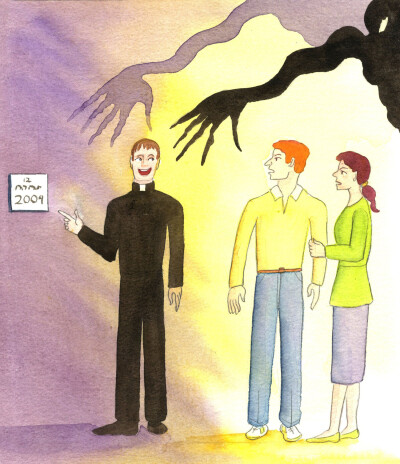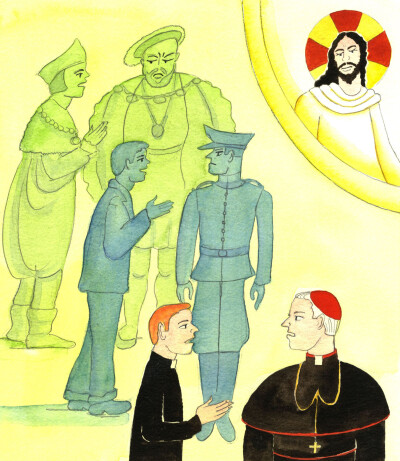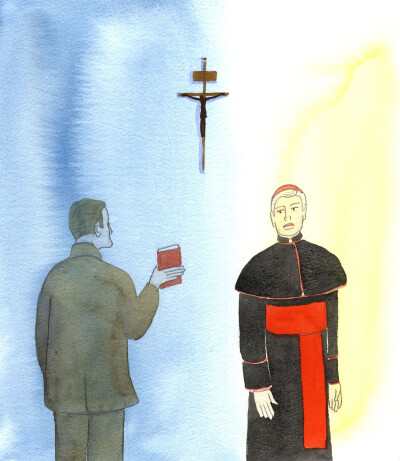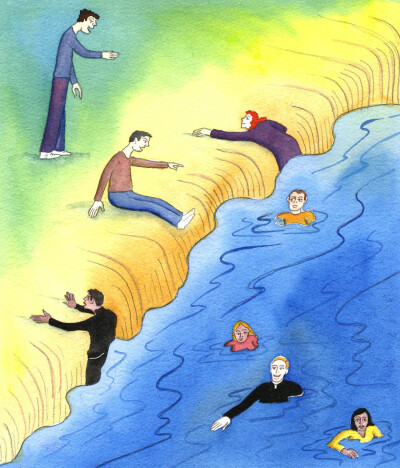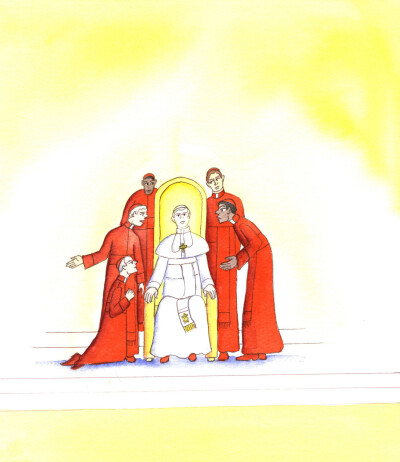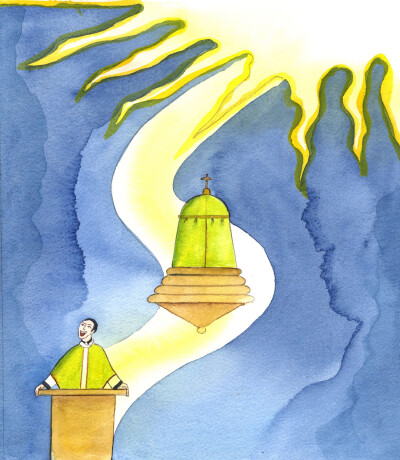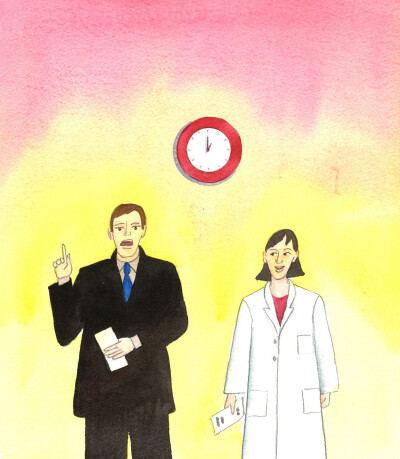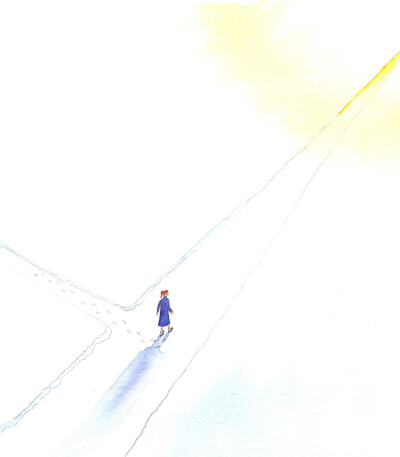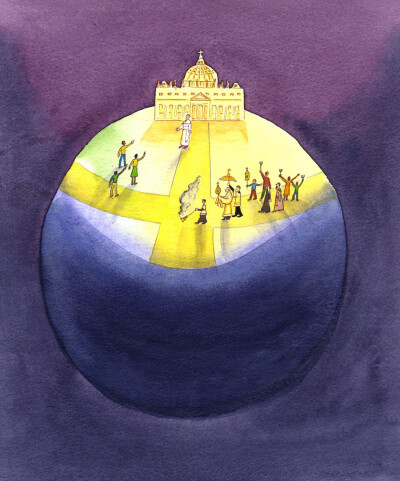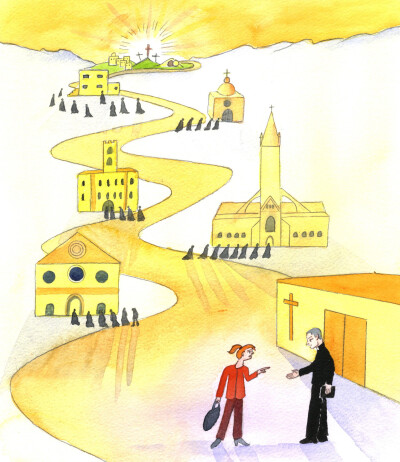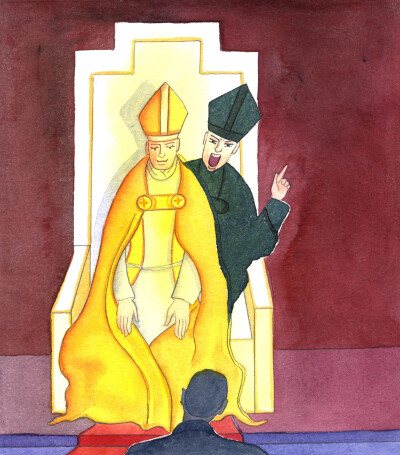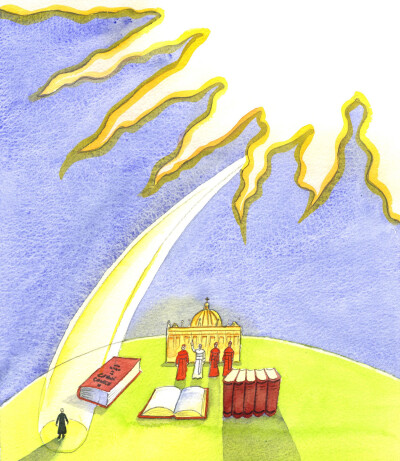Search Page
Showing 181 - 200 of 208
Some Catholics spread distorted beliefs through emotive speech and amusing stories; but Christ knows that the 'wheat and tares' are growing in the Church, side by side. If the weeds are a danger to the Church, the 'wheat' keeps growing, for example, the 'wheat' of the wise teaching of Pope Benedict in his books, interviews and homilies.
When some priests try to appear unnecessarily modern and relevant, Satan is at work today. It is he who persuades so many of the Clergy to water down the Faith, to make compromises with the world, or with other Christians, that are against Church teaching and confuse the Faithful.
It is Satan who helps some of the Clergy to water down the Faith, and to act against the Faith in ways that others do. Christ sees it is as hard for an orthodox priest to speak with a luke-warm Bishop today as it was for Franz Jaggerstatter to speak to the army officer, or St. Thomas More to speak to his king.
Priests should set an example of holiness and purity, neither giving up nor watering down the Faith, nor developing a worldly spirit in order to be popular. They will do little good if they are disloyal to the Saviour, Who asks them to imitate Him, and keep people safe from Hell.
When we talk about the Magisterium we mean that it is Christ Who has given us the Pope and the other Catholic Bishops, to teach us the truth handed on in Sacred Scripture and in the Sacred Tradition. They teach us right from wrong. To spend a life-time arguing about their sure teaching is to waste valuable time, which we could have spent striving for holiness in the service of God and neighbour.
There are people in the Church who dishonour Christ by distorting the Faith. No-one should insult such dissenters; it is enough to speak about the errors in their works; but no Bishop should give them work to do in His Diocese that will damage the souls of his flock, no matter how famous, influential or persuasive that person might be.
Just as the turning-around of a great liner takes up many miles, renewal in the Church is a lengthy process, now being helped by the New Movements. It is necessary because of decades of disobedience, outright dissent, and inadequate catechesis; yet it is lengthy because it takes a long time to slow down the foolish and unnecessary projects and programs in the Church.
Faithful Catholics must continue to be brave and vigilant. Life in the Church has been endangered for two generations, undermined by dissent and watered-down preaching, and false notions of pastoral care; and Catholics who have pointed out the danger - like people revealing a dangerous degree of subsidence next to a Cathedral - have been ostracised, and labelled as 'prophets of doom'.
From the life of Christ on earth, and from His death and Resurrection, has come a surging river of grace, which is the Church with her Sacraments. If we swim in that river, we can be carried to Heaven; but if we separate ourselves from her by our dissent and disbelief it's as if we climb out of that river - to sit on the banks, and then complain.
Bishops are appointed to teach, and to lead the Church in prayer. When the Pope's advisors are discussing which men might be appointed as Bishops, it is not enough for anyone to say that a certain man is very 'pastoral', if he is not also doctrinally-sound in his beliefs, and fervent in ensuring the reverent conduct of the Sacred Liturgy.
It is good that the Pope is advised by a group of colleagues as he chooses men to be Bishops. It is not enough for men to be known as good 'pastoral' men, if they are unsound on doctrine or lack concern for the reverent conduct of the Sacred Liturgy.
We should focus on the tabernacle, and, through it, to Heaven, if strange or distorted things are heard in church from the pulpit. We can be certain that the Father has given Christ to us, Who has spoken all His Father wants us to know; and we can rely on the Church's teaching, given through the Pope and the Catholic Bishops, easily found in our Catechism. We must be confident that the truth has been handed on, and can be known.
Some Catholics choose not to believe in parts of the Church's moral teaching. They are as unwise, and as dangerous to others, as those medical students who might accept all that their professor teaches about physiology and medicine but who refuse to believe what he says about the importance of washing hands and preventing infection.
Some converts who entered the Church in the 1960s and 1970s found the Truths of the Faith, and the sacraments, and Christ Himself, Really Present. Yet they found themselves in an icy landscape; the ice and snow represent what Christ then saw: the icy hearts of those who were itching for inappropriate changes, and who, by strange acts and exaggerations, caused a thousand disasters, including, in part, a de-sacralisation of the words and gestures of the Mass.
God is enabled to act powerfully upon the earth, wherever people are willing to carry out His wishes, and so to fulfill His plan to lead us to holiness; yet His plans are delayed or stopped, on earth, where Catholics raise their voices, and challenge faithful Clergy members who are faithfully handing on the Faith in its fullness. Those who dissent on faith or morals undo God's work, unlike Catholics in the new Movements or Orders, or following in traditional ways, who persevere no matter what the cost.
Christ looks down from Heaven, and notices the great silence in the Church, as few women show concern about their own contraceptive use, only a small number defend the Church's teaching on sexual morality, and many clergy are silent on the subject, preferring to preach about other less challenging issues.
When a Catholic disputes the teaching of the Church on sexual morality, and argues, insisting that the Church is wrong, it's as though that person is arguing with Christ, Who finds that He cannot invite her to undertake great work for Him; for how can He rely on someone to do difficult tasks if she has already refused to carry out His instructions in ordinary life, about sexual morality?
Christ wants us to reflect on what He sees, from Heaven. Christ sees a strange sight, today. In every century, people have accepted instruction in order to enter the Church and lead holy lives. Today, many are badly instructed; many continue with sinful practices; and in arguing with the Clergy about morals some make themselves unavailable for great work for Christ. How can they help Him in great things, if they will not obey in moral issues?
The Clergy sometimes, individually, make mistakes. We are right to respect the man and his office, and to accede to his wishes in the service of God, the Church and our neighbour. We should act with truth and charity towards him; but we are not obliged to believe the personal opinions he expresses if he is in error or offends against charity. A bishop in error confuses us by confusing two contradictory messages: his own, and also the one that he should embody as our Shepherd who guides, teaches and governs in the place of Christ.
We should think about God's nature, when we think about catechesis. Wherever a person whose duty it is to teach the Faith distorts it, or truncates it, to make it more palatable, that person does wrong. God Himself is Truth, so if we offer people a distorted truth, or a truth which leaves out essential elements or difficult-to-comprehend aspects, we insult God, even if we don't realise it.
Showing 181 - 200 of 208


